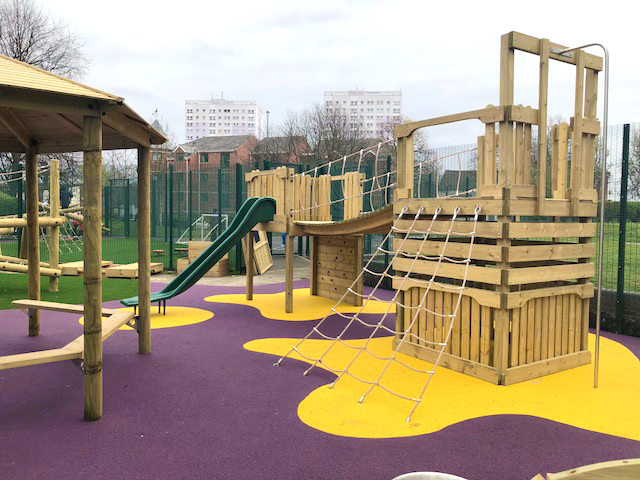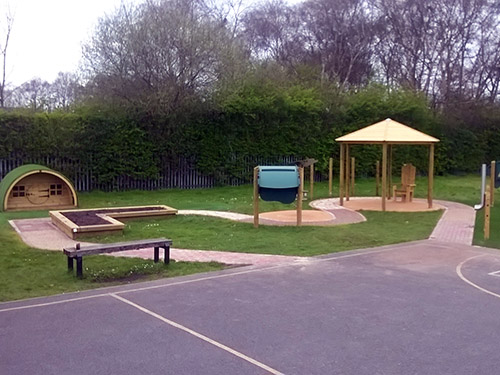Experienced teachers will tell you that no two children are the same. In any group you’ll find those that are good at a wide range of things, presenting different challenges for learning and skill development, within one class, let alone the whole school. Over recent years schools have worked hard to provide better and more inclusive learning experiences yet outdoor space is often last on the list when considering learning opportunities and, indeed, inclusivity.
We’re supporting Children’s Mental Health Week and focusing on the ways teachers can help to develop a positive environment at school, through play and outdoor learning. Establishing a culture of inclusivity - where every child, irrespective of differences caused by disability, ethnicity, gender, religion, belief or faith and sexual orientation, has a common entitlement to a broad and balanced curriculum which meets their social and learning needs - is central to the ethos of Children's Mental Health Week.
Here at Playforce we believe that success in outdoor learning - and in promoting a healthy culture grounded in well being - lies not in thinking about SPECIAL educational needs, but about ALL educational needs and ways in which ALL children can be included in activities, as well as what ‘fun’ means to each of them.
Playforce Consultant, Ben Shears, himself a former Primary School teacher, explains:
“It doesn’t matter whether you’re designing a playground for a dedicated Special School or improving the outdoor learning provision in a Primary School, we try hard not to think in terms of what children can’t do. Instead, we focus on empowering and enabling children of all abilities to take part. For children to learn outdoors they have to feel included and that there is something they too can achieve. This means providing learning and play opportunities that suit a wide range of ability. If you think in terms of ability then no child is separated. All of a sudden play and outdoor learning opportunities become truly inclusive and this can have a remarkable impact on overall health, participation and well being.”
Ben is quick to challenge those that think this means ‘playing safe’, when it comes to presenting learning challenges and opportunities - as well as lots of fun.
“Words like ‘achieve’, ‘progress’, ‘inclusivity’ and ‘ability’ are all great but the most important thing - if we want children to learn through play - is to focus on ‘challenge’. If children aren’t challenged then they don’t experiment and try new things, and they don’t improve their skills. I think it is good that children make mistakes as this is how they learn best. Children of all abilities - irrespective of their differences - need to be given the opportunity to make mistakes and to explore new things - whether that’s physical literacy or curriculum subjects like STEM.”
It can be easy, however, to focus exclusively on the ways schools can support those with disabilities, without remembering that well being and inclusivity extends beyond this. In fact, consideration of the abilities presented by children of different ethnic or religious backgrounds, as well as those of different genders or sexual orientation, is equally important and relevant when considering outdoor learning and when planning a new playground.
Director of Play Services, Oscar Sorabjee explained the Playforce philosophy:
“While the range of abilities and needs might be greater in a school that includes those with special educational needs, the best outdoor environments present challenge, integration, progression and most of all, fun, for all children. That’s why we believe the best outdoor space focuses on what children ‘can’ do, rather than what they ‘can’t’. Naturally, we’re advocates of healthy, active play and learning, but for some children the first step is to get them enjoying being outside in an nonthreatening environment.
“It’s important that schools remember the need for pace as well as variety. Children of different genders, from different backgrounds and with different needs may feel unsure or unhappy in overly active environments, if they are installed without the balance of quieter spaces. They may feel uncomfortable in an environment that is full of loud, busy and active play, if there is nowhere for them to go for quieter or more reflective play. It has been interesting to note that a number of the schools we’ve worked with have recorded an improvement in the number of complaints of bullying or challenging behaviour as a result of the inclusion of quieter seating areas or products such as our Buddy Bus Stop Hut, alongside more active products like our Active Trails.
“Providing a range of options for play, as well as versions of the same activity - so that peers of different abilities can play and learn together - can be a great way of achieving inclusivity, while also offering opportunities for every child.”
Over February we’ll be sharing a wide range of pieces looking at ways schools can better support children’s mental health through outdoor learning and play. To stay up to date with everything going on for Children’s Mental Health Week you can follow the organisers @Place2Be on Twitter, as well as our own social media channels, throughout February


Reach Primary Learning Centre- Case study Woolston CE Primary School- Case Study